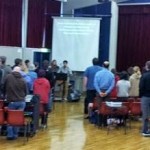Highly recommended reading – two articles on using music in gathered worship by Scott Mackay:
Stating the obvious about church music (Scott Mackay) http://t.co/jTdyK09VAx
— the kiwifruit blog (@kiwifruitblog) March 4, 2013
Deconstructing church singing (Scott Mackay) http://t.co/Pc4yJbWTFp
— the kiwifruit blog (@kiwifruitblog) March 5, 2013
In the first piece, “Stating the Obvious About Church Music“, Scott argues for a shift in thinking from worship music as a distinct and separate part of our gatherings, to using music as one of several ways Christians minister to one another and worship God corporately:
“There is a subtle paradigm shift I believe needs to take place in our thinking. We often treat singing as a distinct activity of corporate worship. This is understandable, especially as the musical ‘event’ occupies quite a distinct space in our church services. Our expectations of musical professionalism are higher post-revolution (the worship music revolution of the mid to late 90’s), and this had led to a tightly defined activity called ‘the music’ which is often quite detached from everything else that happens in a church meeting.”
I think others would date this revolution earlier to the 70’s and the Jesus Movement. The result today is definitely a tightly defined activity called “worship” in most churches.
“I believe we need to primarily think of singing as a particular way of engaging in activities that we also do without the aid of music — activities such as declaring, confessing, praying, praising, etc.”
This paradigm shift can help Christians to guard against falsely elevating the role of music, and to clarify what we are actually doing when we sing.
My own (minor) push-back in this first article would be this comment:
“In this environment, it’s possible to lose sight of a very simple truth about congregational singing: singing… is simply a mode of human speech.”
To say that “singing… is simply a mode of human speech” risks minimising the distinctiveness of singing. Can we say there’s no difference whether you say the words to a hymn, or sing it, or pray it? I’m not sure. I think there is a uniqueness about singing in that this mode engages us emotionally in quite an acute way.
For example, Philip Jensen states:
Music is emotional: be it happiness or sorrow it engages us emotionally (e.g. Psalm 137, James 5:13). Singing gives voice to our emotions. Congregational singing unites us in expressing our common belief by articulating how Christians feel.
The congregational singing throughout the book of Revelation (Rev. 1:5-6, 4:11, 5:9-10, 7:11-12,11:17-18, 15:3-4, 19:6-8) suggest to me that we’ll be doing a lot of singing in the New Creation, and underscores the importance and uniqueness of singing. The Psalms specify song after song to sing of all that God has done – not pray, not catechise (these are brought up in other passages, to be sure). I’m an advocate of using a variety of means to address one another in church, but not in a way that loses the distinctiveness of sung worship.
In the second article, “Deconstructing Church Singing“, Scott gives some practical tips to ensure that “singing and music are simply seen as one means to express praise, devotion, faith, thanksgiving, and prayer”:
1. Recover the devotional use of the Psalms
2. Incorporate singing more seamlessly into services
3. Teach the congregation about singing.
4. Ensure the musical accompaniment supports the singing of the congregation, rather than overwhelming it.
5. Use other means of corporate participation.
6. Change the way we talk about singing in church.
I see all six points as areas where I can personally grow in as I consider leading others in gathered worship.
Both articles would be a helpful read for anyone interested in music, singing and the church.
What are your thoughts?
————————————




Hi William,
Thanks for the link.
On the distinctiveness of singing, I did actually say in the same post: ‘singing is one of God’s good gifts, and unique in the sense that it brings together deep emotional engagement and beautiful unity of expression.’
But personally, I feel like the distinctiveness of singing is almost self-evident. It’s interesting that in the Bible, there is never really attempt to justify why we should sing, as opposed to speak, God’s praise. It’s just something we do! Something humans do. Something that is appropriate to us as created beings, bubbling with culture and that emotional affective dimension to our nature that is so fundamental to us as humans.
There’s an interesting different between Luther and Calvin on this point – Luther seeing music as more than simply a human phenomenon. Calvin saw music as created by God only in a secondary sense because it is a development of human culture. I think the revelation thing is interesting to think about in this respect, because the heavenly beings in Revelation don’t sing – only humans do. It’s an echo of the Exodus event, and the Song of Moses (Ex 15), where Israel burst into song after their redemption from the Rea Sea. The singing in Revelation doesn’t communicate to us that singing in itself is a heavenly phenomenon, but rather a phenomenon of redeemed humanity.
Love your blog! keep it up.
Ah – I missed that further down. And I appreciated you probably phrased it that way in the context of trying to swing to pendulum/paradigm the other direction.
Didn’t know about the Luther-Calvin distinction. I wonder if those principles informed the hymns that resulted from them…
On only humans singing – I don’t know if it’s that clear cut. The living creatures and elders sang a new song in Rev 5 in praise of the Lamb who was slain. As for angels, it’s true that the chorus of angels that appeared for Jesus’s birth didn’t sing “Glory to God in the highest” but said it… But at creation they were certainly shouting for joy when the morning stars sang together (Job 38:6-7) – so music seems to have been a known concept before humans came up with it in Gen 4. Even God is depicted himself as exulting over his children with “loud singing” (Zeph 3:17).
It’s interesting to see through the Bible so many critical moments in God’s redeeming history expressed in song (kinda like in stage musicals like Les Mis where people burst into song at the important bits…). Maybe it’s not “heavenly”, but it seems like a heightened form of communication to me.
You raise some good points there, and I certainly agree with your last point about the significance of singing happening as a response to redemption. I don’t think there’s any mystery about that – the reason is that it’s the way we express joy or celebrate something. Singing is predominantly an activity of redeemed humanity in the Bible.
It’s true that the living creatures sing in Rev 5, and so I should probably nuance my statement that ‘only humans’ sing in the book. But the living creatures here are not angels or heavenly beings. Rather, the four living creatures are representations of the whole of the created order (c.f. Ezekiel 1). It’s really a picture of creation worshipping God, rather than a reference to actual beings participating in music. The creatures are a personification of creation.
You’re right, the angels don’t sing in Luke 2. As for Job 38:7, even taking into account the poetic nature of the material, the two verbs are ‘cry aloud’ and ‘shout’. They’re not referring to singing or music. Angelic and heavenly beings are pictured in Scripture, not as choirs as Christian art/music has sometimes presented them, but as either heavenly military figures or members of the divine counsel. Zeph 3:17, I think it’s safe to say, is a metaphorical representation of God, rather than a statement about his musical abilities.
So I think I’d want to stick with Calvin on this, and say that music is a human phenomenon. But thanks for driving us back to the text mate!
Thanks for the prompt exegesis – fair points all round. I guess I’ll have to keep working on my biases. You are after all speaking to a Music major and former/ongoing idolator of music!
We all have biases brother, I doubt a high view of music is a particularly serious one (although perhaps I’m biased towards music too!)